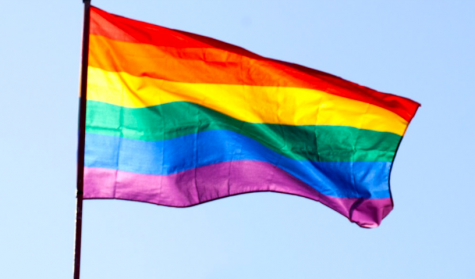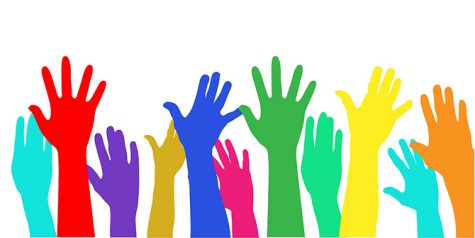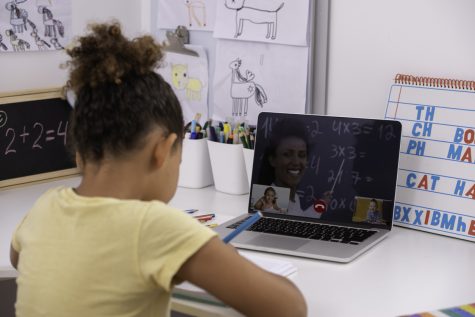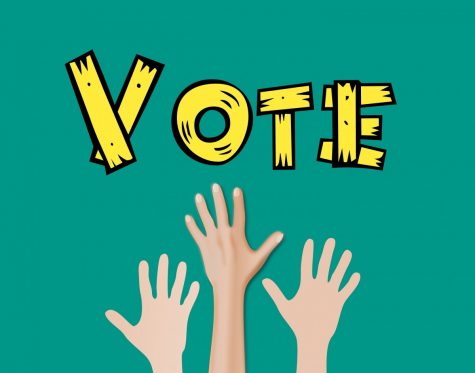United Nations should focus more on human rights
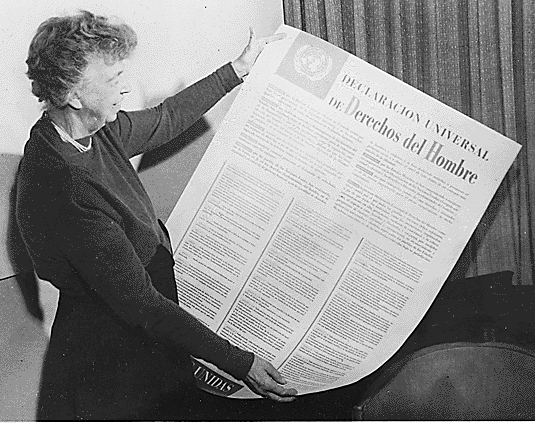
Eleanor Roosevelt, U.S. delegate to the United Nations, holds a copy of the Universal Declaration of Human Rights in 1948.
The right to live. Universal religious tolerance. The freedom of thought, of conscience, and of opinion.
These rights, these freedoms, these decrees of entitlement, are these not inherent among the entirety of the human race?
In the United States, for the most part, along with many other parts of the world, they are. These birthrights are attributed to every human being despite their race, heritage, or gender all over the globe. And if an individual deprives another of these rights, they are punished accordingly.
Aren’t they?
On Dec. 10, 1948, the United Nations General Assembly proclaimed the Universal Declaration of Human Rights in Paris. Drafted by representatives from every region and every cultural and legal background on the map, this declaration serves as a collection of the fundamental rights every single person is born with. Rights of which it is our obligation to protect in order to ensure their longevity, enforcement, and prosperity.
Nonetheless, it seems that these rights are continuously violated everyday. These violations can be traced back to the United Nation’s neglect to address humanitarian issues and tendency to focus on political foreign involvement both diplomatically and by means of force. It is vital that this focus shifts and recognizes the devastation being inflicted upon countless people who are in desperate need of a voice.
While most of us have never experienced extreme hunger and all of the devastating matters that coincide with it, 795 million people in the world do not have enough food to lead a healthy, active life according to the World Food Programme.
Sixty-four nations still do not practice religious freedom, and these countries make up 70 percent of the world’s population, as stated by Pew Research Center.
Female genital mutilation affects over 125 million girls and women in 29 countries from Africa and the Middle East, and 650 million boys and men across the whole globe, according to Makers.com.
The list goes on.
We see it on the news, we hear it from our peers, we are shown pictures and videos of travesties inflicted upon our fellow humans by other humans. And then we shake our heads, turn away, and proceed onward with our day, turning a blind eye to other’s tragic misfortunes and thinking to ourselves, “The world is in a very bad place.”
We constantly ignore the blatant transgression of these inalienable rights established to recognize the intrinsic dignity and lay the foundation for freedom, justice, and peace.
But this is our world. Many of us are young and, as teenagers, it often seems as though the influence we can have on grand concepts such as these is limited. However, this is the harsh reality of the time we are growing up in and, sooner than later, the time will come where every appalling misgiving overseas won’t seem that far away anymore.
We cannot afford to standby as people are deprived of indisputable human rights.
Life, expression, employment, education, healthcare, religion, thought, and protection, amongst others.
Disregard and contempt for these rights is synonymous to treason against humanity, whereas abiding by them ensures freedom from fear, freedom of speech, and freedom of belief in an increasingly globalized world. They serve as a common ground and a basis for understanding and cooperation in a high functioning and developing society that can continue to evolve, grow, and prosper as a peaceful unit.
There is no room for debate. These declarations cannot be overlooked.
An Arab girl from the ruined streets of Syria is entitled to the same natural rights as a Jewish white man from the suburbs of Illinois. A homosexual boy from Cairo is entitled to the same natural rights as a heterosexual businesswoman from London. An 80-year-old man from Thailand is entitled to the same natural rights as a newborn from Venezuela.
These rights are all-embracing. They do not protect a specific race, religion, nation, culture, social class, gender, sexuality, or age, but every coinciding individual and citizen of Earth.
So if the world is in such a “bad place,” the question is, what are we going to do about it?
In the interconnected global world of which we live, there is no excuse for any developed country to ignore the existence of underprivileged societies and to not provide means for uplifting said social classes. On the other hand, individuals in groups who deprive citizens of their rights are committing an infraction against humanity and must be held accountable by international justice forces.
There is, of course, a boundary that cannot be crossed in terms of foreign influence on domestic functions. Nonetheless, it should be the role of the UN to ensure that these universal and moral laws are followed. These rights, which must be exercised on behalf of every man and woman and child across the globe, are far more important than the bureaucratic organization of the world.
It is every nation’s collective duty to safeguard the natural rights of the world population and to abide by the just laws attributed to all.
For example, rather than attempting to reshape an entire nation’s form of government that had functioned well enough before UN influence, we must turn our attention to the quality of life lived by the common folk who inhabit it. In some cases, such as an extreme tyrannical dictatorship, political interference can be necessary.
Can we live with the guilt of ignoring something as implicit as mass genocide, and instead choose to feign ignorance in the interest of corporate profit?
If the Universal Declaration of Human Rights is not clear enough, there is always that voice of reason speaking quite loudly and articulately in the back of each and every one of our minds.
We live in an internationalized era, and a violation of someone’s human rights across the Atlantic in Cameroon, across the Pacific in Indonesia, or to the south on the island of Jamaica, will not go unnoticed here in the United States.



